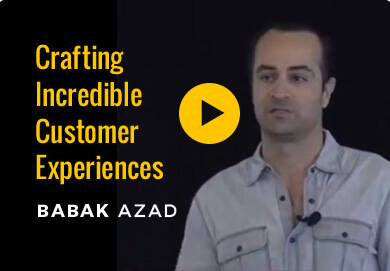
This post is directed more to entrepreneurs but if you want to work with an entrepreneur but don’t feel like you know what product/service to launch, if you look closely, you’ll see a way to do so (I’ll reveal near the end).
I love entrepreneurs. They create something that wasn’t there. They buck trends. They tolerate the mocking of their friends (and oftentimes customers). It’s at times a lonely, thankless, and sleepless life.
And if you want to be good at building a business, you have to focus on product and sales. Without it, everything else doesn’t matter (I’m excluding those businesses focused on audience and list-building – see Facebook). And so they and their organizations have to move as rapidly as possible to just start generating sales. Optimizing the back-end, operations, etc. is simply not the best use of time on day 1 if there are no orders to process.
But then once the business has gotten some traction, the business needs additional attention. But oftentimes the entrepreneur is still in “Ready, Fire, Aim” mindest. Or even “Fire. Fire. Fire.” Selling. Selling. Selling. And not tending to working “on” the organization. A lot is done on the fly and on gut instinct. And frankly, I can’t argue with folks who have built their business to some scale with that approach.
But that doesn’t mean that you can’t add and build on that. In particular, I’ve found that the following 2 roles, if added to many organizations, would create huge value but are often ignored.
1. The analyst.
If you don’t have basic KPI’s (or know that KPI stands for “Key Performance Indicators”), and don’t have someone in your org running even basic reports, you’re missing out. Yes, having more money in the bank at the end of the month than at the beginning of the month is a good thing, but as Peter Drucker once said, “If you can’t measure it, you can’t manage it.”
The moment you start tracking and measuring a metric in your organization, it will almost immediately get better. Partly because it just forces people to stare at a number. Or even that it allows people to look at a number. It just happens.
To be clear, even though the role is called “analyst”, to start, you don’t even need someone to run analyses. Just basic reporting would be good enough.
Many organizations would be best served by hiring a kid straight out of college who wants to learn the business. They don’t need to know anything about your business. They just need to be able to navigate Excel. And if you have any sort of scale, that investment is going to ROI within 3 months max.
2. The Disciplined Operations Person
Many / most entrepreneurs have short attention spans – it’s actually what drives/allows/inspires them to do what they do so I am definitely not mocking that personality trait. But every idea person needs a counterpart. (Insert reference to Batman needing Robin…)
I was recently talking with a potential client who said they needed another idea person in their organization, so that they didn’t feel the pressure to have to come up with ideas all the time. Which might actually have some truth to it. The problem, however, is that they are really good at developing ideas and it’s what they really enjoy. And in this case, if they just brought on someone to help make sure balls don’t drop, it would give them more time and peace-of-mind to focus in on what they probably should be doing.
Many growing businesses would be better served to do the same. The problem is that the personality type of the individual who focuses on execution, makes sure that stuff gets done, etc. can be very different, almost diametrically opposed, to the entrepreneur. They’ll likely ask more questions, be more detailed-oriented, tend to say “no”, etc.
And it’s not that they should have zero ideas. That’s silly. But it is to say that they should be more focused on execution and operations than the next big product or service.
And frankly, very likely, others in the organization will appreciate someone in this role (assuming of course they aren’t a jackass…). People who’ve been with a company from their early days get used to the crazy nature of the entrepreneur, and yet, more often than not, they are yearning for someone with some sense of authority, to help prioritize and create a semblance of organization in the company.
Entrepreneurs like to climb peaks. These operational people like to operate at high plateaus. There’s a place in companies for both. And if they’re good, you should hopefully be less likely to say, “Why did we stop doing that thing that was making us a ton of money? I don’t know. We just moved on to something else.”
How to Find Them?
As I mentioned, the analyst role just needs to be someone smart, hungry, and adept at Excel. All of which you should be able to screen for and create an Excel test for (one of the best tools I added to my interview process for those folks years ago – feel free to shoot me an email at babak@babakazad.com for sample job descriptions or the Excel tests I’ve used).
As for the ops role, if you’re an entrepreneur, the first point I’ll make is that you’re not going to find this person hanging out with your friends. Because very likely your friends are just like you. So you’ve got to start going to more “corporate” events, reaching out to your network, looking at job postings you think mirror the role you want (hint: if the job description makes you think you’ll go crazy doing it, that’s likely the right one!).
And if you want to get in to a growing company and feel like you might fill one of these 2 roles, you also need to stop hanging out with your friends. Go to events where entrepreneurs hang out – mastermind groups, networking events, etc. And remember, they may at first not realize the value you add. So you need to speak in their language – what benefit and value will you bring to the organization, what have you done before, are you as passionate about their business as they likely are.
In this case, I’d hesitate to say that “opposites attract.” But I would say they can help each other out. In a big way.
Please leave a comment below because I’d like to hear what you think.






Leave a Reply
You must be logged in to post a comment.